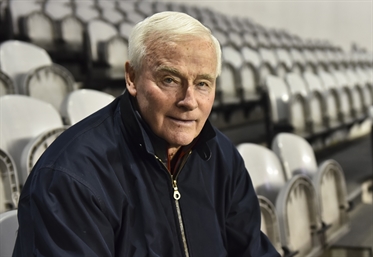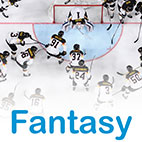Hail to the King: Part 1
Hail to the King: Part 1
Talking Hockey Canada with IIHF Hall of Famer

 PARIS, FRANCE - MAY 10: Dave King of team Canada poses for a photo during team Canada practice - 2017 IIHF Ice Hockey World Championship. (Photo by Matt Zambonin/HHOF-IIHF Images)
PARIS, FRANCE - MAY 10: Dave King of team Canada poses for a photo during team Canada practice - 2017 IIHF Ice Hockey World Championship. (Photo by Matt Zambonin/HHOF-IIHF Images)
The 69-year-old native of North Battleford, Saskatchewan has an incredibly diverse resume. Cerebral, curious, and blessed with a relentless work ethic, King burst on to the international scene when he helmed Canada’s first World Junior gold medal team in 1982. In addition to his Olympic runs, including a silver medal in Albertville 1992, King coached six Canadian World Championship teams, earning bronze as an assistant in 1982 on a team with Wayne Gretzky, silver in 1989 with Mark Messier and Steve Yzerman, and silver in 1991 with Joe Sakic and Rob Blake.
From coaching NHL clubs and teams in Russia, Germany, and Sweden to serving as the GM of Team Japan at the 1998 Olympics, King has never shied away from a new challenge. He was inducted into the IIHF Hall of Fame as a builder in 2001.
We caught up with King at a recent Team Canada practice at the AccorHotels Arena. This is Part 1 of a two-part interview.
The last time you served as an assistant coach with Team Canada was in 1999 in Norway. How did you get involved with this year’s team, and what’s your role?
Hockey Canada had a contingency plan in case the NHL players didn’t participate in the Olympics. And so throughout the year, I’ve been doing a little bit of work with Hockey Canada at the Deutschland Cup and the Spengler Cup. We were looking at players that could possibly play at the Olympics if NHL players don’t go. To follow up that, they said: “You should come to the World Championship and coach with our team and get familiar with some other teams that would be playing at the Olympics.”
There are a lot of teams here, like Slovakia or Germany, and we get a chance to see these teams, do a little bit of work on identifying what they do, so that if we are going to play at the Olympics, we have a good handle on our opponents. Some of these teams have very few NHL players, like Norway or Denmark. This would be 90 percent of their Olympic teams. It’s good for us to be here.
Did you say yes right away when you got the invitation?
Oh yeah. It took me about five seconds to say yes. I love coaching. I’ve coached a long time, and I always enjoy it. So it was great to be invited to take part. I think it’s a great opportunity. I like Hockey Canada’s game plan. They have a Plan B that started last year, just in case the NHL didn’t participate. It’s good to be part of that plan.
You have a unique perspective as the head coach of three Canadian Olympic teams in the pre-NHL Olympics era. How did you feel when full NHL participation began back in 1998?
It was a two-phase reaction. In the first phase, I was saddened because there are a lot of young players who have used the Olympics as a way to develop their skills and then step into the NHL and become good players. So it was a good development situation for so many young players. However, any time you can get best-on-best, at the best time of the year, when they’re at peak fitness and everything else, it makes sense that that would be a great competition. If you look at the Olympics since NHL players have been there, it’s been really exciting competition. Fans want to see the best on best, and it achieves that.
Twenty-five years ago, you were here in France to coach a very strong silver-medal Olympic team in Albertville with Eric Lindros, Sean Burke, and Joe Juneau. People remember Burke barely stopping Peter Draisaitl’s shootout attempt when you won the quarter-final against Germany. What else stands out for you about Albertville?
The main thing is that we had a terrific year. That whole season was terrific. To watch your team just slowly get better and better, it’s one of those things for a coach: when your team plays the best it can play at the most important time of the year, you’re going to be successful. We got to the gold medal game and lost to the Russians. But when the season’s over and you can say your team gave you as much as they could possibly give you, that ‘92 Olympic team was like that. It was a special group of guys. It was a wonderful opportunity to coach with two good friends of mine, Terry Crisp and the late Wayne Fleming. We had a lot of fun.
What was it like to travel with the old standing national team?
We played in some very interesting places. What was really good about the program was that we would play tours across Canada against the Russian national B team. We played in the smallest communities. Sometimes we’d play in communities where the rinks had a capacity of 2,000 people maximum. It was an event for those little towns. The ability for us to go across Canada and play in so many smaller centres that never thought they’d ever host a Team Canada-Russia game, I think that was the most important and most fun thing. Every one of those games, there was a coaching clinic that we’d put on. There was a supper with the Russian team. These were really special events. I enjoyed that.
In the 1980’s NHL, some players still smoked, ate junk food, and didn’t work out much. What was your national team conditioning program like?
I think we were probably on the leading edge of today’s fitness movement. We had terrific people that gave us their consulting services for our fitness program. Dr. Howie Wenger at the University of Victoria was a famous guy who did a lot of work for us. We had nutritionists. Our team, in that era, was doing extra stuff, especially with off-ice training during the season. Most teams in those days, other than the Russians, would do what you’d call easy workouts just to maintain that level of fitness. We went and trained really hard, a little bit like the Czech or Russian models, not only on the ice, but off the ice too.
Sometimes it confused the players. I think the players thought, “My goodness! This is going to affect my play on the ice! I’m going to be tired.” But after a couple of months, they all figured out that you could do this. You could push yourself further than you thought. And that was one of the things the national team always did. It taught guys they could get more out of themselves by putting more into it. So it was great.
How has the team-building process for Canada at the Worlds changed compared to when you were winning medals here in the late 80’s and early 90’s?
Teams at the Worlds now get players off all different NHL teams. It’s a real melting pot. One of the most important things is to give them a little bit of time off the ice together too. Right now, we take our guys out to suppers together. We’ve gone on tours together. We do a lot of things off the ice to try to bring our team together. At this event, we’ve already had a tour of Paris. We’ve had a couple of special suppers at unique restaurants. So Hockey Canada does an awful lot to make the players comfortable. They bring their families over. Hockey Canada makes it a special event for the players. That whole process brings us together.
I think the one thing that’s magic, too, is that sweater. Any time a guy puts that sweater on, it just seems like they’re happy to be part of it. They don’t have to have a leading role. They’ll do what you want. They’ll sacrifice. A lot of these defencemen play 25 or 26 minutes in the NHL. Here, you play your share. They have to give up some of that personal agenda for the team. But they all do it because they’re wearing the sweater and that means a lot to them.
What impressed you most about the job Mike Babcock did at the last two Olympics?
Mike’s got that ability to bring players from different clubs together and they respect his reputation. To get all those guys to play a real team game, you’re talking about the superstars, the top echelon in the league. Mike can get those guys to all buy in and play for the sweater, not the name on the back. I think that’s what Babs does so well.
Interestingly enough, his team this year in Toronto, I think it might be one of his greatest achievements in coaching. He took that really young team that had a lot of question marks behind it, and they had a wonderful season. The future looks good. He’s a very good coach.
Back to Overview
































































































